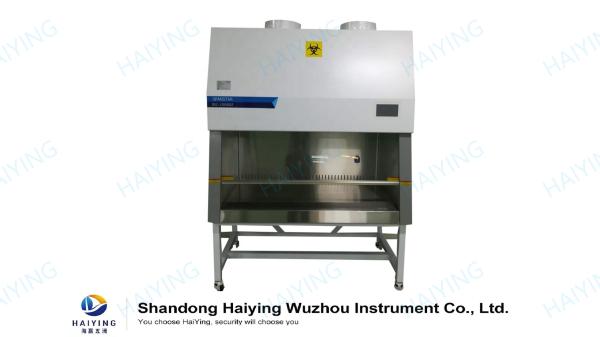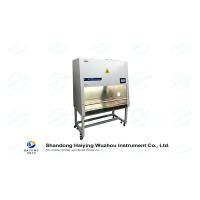With the development and progress of the medical level, many
hospitals have established pathogenic microorganism laboratories in
order to provide timely and reliable clinical diagnosis and
treatment.
Basis. The interpretation of pathogenic microorganisms detection
results and the determination of infection are important basis for
clinical diagnosis and the basis for correct treatment in the later
stage. In the pathogen
In the first few steps of microorganism extraction, it is necessary
to directly contact the biological samples of the case. The process
involves heating and cracking. When inspectors hit
When opening the sample container, aerosols containing pathogenic
microorganisms may be dispersed into the air environment.
Therefore, operate in the biological safety cabinet of the negative
pressure laboratory
Make it safer.
| Model | BSC-1300B2 |
| Clean Grade | HEPA:ISO 5 calss ( Class100 ) |
| ULPA:ISO 4 Class ( Class10 ) |
| HEPA Filter | HEPA:≥99.995% , @0.3μm |
| ULPA:≥99.999% , @0.12μm |
| Air tightness | 99.99≤E≤99.999 |
| Overall Dimensions | 1500×800×2120mm |
| Working Space | 1300×700×600
mm |
| Downflow Velocity | 0.35m/s |
| Forward intake wind speed | 0.25m/s±0.025m/s |
When exhausting through the exhaust system of the facility or using
biological agents, ensure that
Protect the environment and personnel from aerosols, but cannot
protect products from pollution.
dye. The air discharged from the outside or the room is
recirculated to the laboratory and used in the exhaust
HEPA filter.
1.2 Level 2
Properly ventilate and handle biological agents and hazards through
the facility’s exhaust system
Protect the product, laboratory personnel and the environment when
risking drugs. For HEPA filter
For external exhaust or room recirculation, HEPA is used in both
air supply and exhaust
filter. Therefore, it is the most widely used. According to inlet
air velocity and exhaust
In the wind circulation mode, the second-level biological safety
cabinet can be divided into four levels: A1, A2, B1, and B2 [2].
1.2.1 In the A1 safety cabinet, the minimum average of the suction
port through the opening surface of the workbench
The wind speed is maintained at 0.38m/s; the vertical downward air
after being processed by the high efficiency filter
70% of the original circulating gas is filtered, and 30% is newly
inhaled and passed
Filtered supplementary gas, 30% of the original circulating gas is
efficiently filtered through the exhaust port
The filter is discharged into the laboratory.
1.2.2 In A2 safety cabinet, the minimum average wind passing
through the suction port of the open surface of the workbench
The speed is maintained at 0.5m/s; the vertical downward air flow
after being processed by the high efficiency filter,
70% of the original circulating gas is filtered, and 30% is newly
sucked and filtered
Supplementary gas, 30% of the original circulating gas passes
through the exhaust port high efficiency filter
The filter is discharged outdoors and no longer returned to the
laboratory.
1.2.3 In the B1 safety cabinet, the smallest average of the suction
port through the open surface of the workbench
The wind speed is maintained at 0.5m/s; the vertical downward air
after being processed by the high-efficiency filter
30% of the original circulating gas is filtered, and 70% is the
newly inhaled filtered supplementary gas, that is, most of the
original circulating gas is efficiently passed through the exhaust
port.
The filter filters and discharges to the outdoors without returning
to the laboratory. All organisms
The contaminated air duct and static pressure box should be kept
under negative pressure, or the negative pressure air pipe and
static pressure box should be enclosed
stand up.
1.2.4 In the B2 safety cabinet, the minimum average of the suction
port through the open surface of the workbench
The wind speed is maintained at 0.5m/s; the vertical downward air
flow after being processed by the high efficiency filter
All are the newly inhaled filtered gas, and all the original
circulating gas passes through the exhaust
The air port high efficiency filter filters and discharges to the
outdoors, not returning to the laboratory. all
Contaminated air ducts and static pressure boxes should maintain
negative pressure or be directly exhausted by air ducts
Surrounded with static pressure box.










